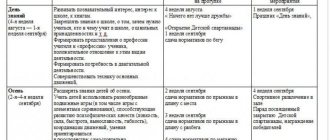Features of some thematic plans
According to the new federal educational standards, a long-term thematic plan for economics (or any other academic discipline) contains those basic concepts, as well as educational standards, that schoolchildren must master. Be sure to note interdisciplinary connections that allow for deep assimilation of educational material.
The long-term thematic plan for correctional work is different in that before each new lesson the goal is adjusted, taking into account the psychological mood of the children for the lesson and their physical condition.
Rules for dividing topics in the curriculum
A long-term thematic plan is drawn up according to certain rules:
- new material in each lesson should have 3-4 questions that students must learn;
- the material selected for the lesson must be complete in content and have a specific didactic purpose;
- The sequence of arrangement of educational material for individual lessons requires adherence to a logical chain, ensuring internal interconnection, and a gradual increase in the complexity of educational tasks.
When determining the volume of educational material that will be considered during the lesson, you need to take into account the likelihood of its consideration and deepening during the period of time allotted for the lesson.
Perspective-calendar, complex-thematic planning has a certain basis. It consists of lessons designed to study new educational material, and also includes classes of a combined type. Also, the perspective-thematic plan involves listing all excursions, laboratory, practical work, and test classes. The table indicates the serial number of the lesson, the name of the lesson (topic), the main elements, and homework.
Essential Details
In long-term planning, it is important to pay attention to the practical activities of schoolchildren, independent and laboratory work. The main point is to determine the approximate result of the student’s educational work, correlate it with the purpose of the lesson, and identify the educational product. The teacher must carefully consider the means of control, forms, and methods of its implementation. Thanks to ready-made long-term thematic planning, the activities of a young specialist are significantly simplified. Practice shows that the final result of education and training depends on the completeness and thoughtfulness of thematic plans. Experienced teachers know this; they try to incorporate the necessary elements into planning as much as possible, so as not to waste time on significant adjustments to the preliminary plan during the work process.
Goal setting is a conscious process aimed at identifying and setting tasks and goals for all teaching activities. The teacher feels the need for preliminary planning of his work; he is ready to model the main tasks taking into account specific pedagogical situations. An experienced teacher is able to transform the goals set by modern society for educational institutions into joint activities with schoolchildren.
The difficulty that young teachers experience is the correct transfer of learning results into practice, taking into account the physiological and psychological characteristics of modern schoolchildren.
A well-thought-out plan for a specific lesson reflects the preparatory work carried out by the teacher. Of course, this cannot be considered a complete guarantee of achieving all the goals and objectives set by the teacher, but it is planning that is recognized in the pedagogical community as a prerequisite for conducting a quality lesson.
The wording of the objectives for the lesson should include the following words: identify, justify, show. A teacher cannot achieve high results from conducting a lesson if he has not first drawn up a good written plan. This process is a creative undertaking; it will require significant time investment from the teacher. The lesson plan indicates the volume and content of homework. The planning structure is influenced by the specific personality of the teacher, as well as the characteristics of the student population.
Plan Components
Any graduate of a pedagogical school knows that there are certain rules in preparing a training session. A perspective-thematic lesson plan for academic disciplines is an essential element in preparing for a lesson for any modern teacher.
It includes the division of educational material designed for the academic year into separate sections and topics. If we consider the perspective-thematic plan in general, it should be noted that in addition to the names of the topics, it indicates calendar time, homework, as well as those skills that schoolchildren will have to acquire.
Planning purpose
A long-term calendar, comprehensive thematic plan determines the required number of training sessions on each topic. Since it reflects the system of lessons, it is possible to trace the logical sequence of students acquiring new skills and knowledge, consolidating and generalizing the material previously studied. The educational process necessarily includes the main links of the educational process:
- learning new material;
- the process of systematizing acquired knowledge;
- improvement and consolidation of the studied material;
- practical application of ZUN;
- developing skills and abilities in schoolchildren;
- control over students' educational achievements.
The teacher divides the material of the entire topic into separate parts that correspond to the content of the lesson, arranging them as they are studied (with an increasing degree of complexity).

